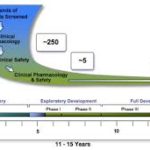
Authors of a new study published in JAMA Internal Medicine research found that just one-fifth of confirmatory trials for cancer drug indications approved via FDA’s accelerated approval pathway demonstrated improvements in overall survival (OS). Although improvement in surrogate measures may be acceptable for accelerated approval, confirmatory trials should verify the clinical benefits in terms of overall survival (OS) or quality of life. (Regulatory Focus)



 The author argues that, in the FDA drug approval process, manufacturers have a strong motivation to promote the effectiveness of their drug, while downplaying the risks. This is called “the funding effect”- when scientists are hired by a firm with a financial interest in the outcome, then the likelihood that the results will be favorable to that firm is dramatically increased. (Bill of Health)
The author argues that, in the FDA drug approval process, manufacturers have a strong motivation to promote the effectiveness of their drug, while downplaying the risks. This is called “the funding effect”- when scientists are hired by a firm with a financial interest in the outcome, then the likelihood that the results will be favorable to that firm is dramatically increased. (Bill of Health) A study published in JAMA Oncology found that 1 in 6 cancer drugs approved between 2013 and 2018 were supported by randomized controlled trials (RCTs) that do not prove the drug’s superiority over the standard of care, as their control arms did not accurately represent the standard of care. “The choice of control arm should be optimized to ensure that new cancer agents are truly superior to what most clinicians would prescribe outside a clinical trial setting. (docwire)
A study published in JAMA Oncology found that 1 in 6 cancer drugs approved between 2013 and 2018 were supported by randomized controlled trials (RCTs) that do not prove the drug’s superiority over the standard of care, as their control arms did not accurately represent the standard of care. “The choice of control arm should be optimized to ensure that new cancer agents are truly superior to what most clinicians would prescribe outside a clinical trial setting. (docwire) Run-in periods are occasionally used in randomized clinical trials to exclude patients after inclusion, but before randomization. During a run-in period, all patients receive the same treatment– for example, a placebo, the experimental drug, or observation only. A recent analysis of published trials found that 5% reported a run-in period, which could affect study validity if a large number of patients are excluded. (Dovepress)
Run-in periods are occasionally used in randomized clinical trials to exclude patients after inclusion, but before randomization. During a run-in period, all patients receive the same treatment– for example, a placebo, the experimental drug, or observation only. A recent analysis of published trials found that 5% reported a run-in period, which could affect study validity if a large number of patients are excluded. (Dovepress)